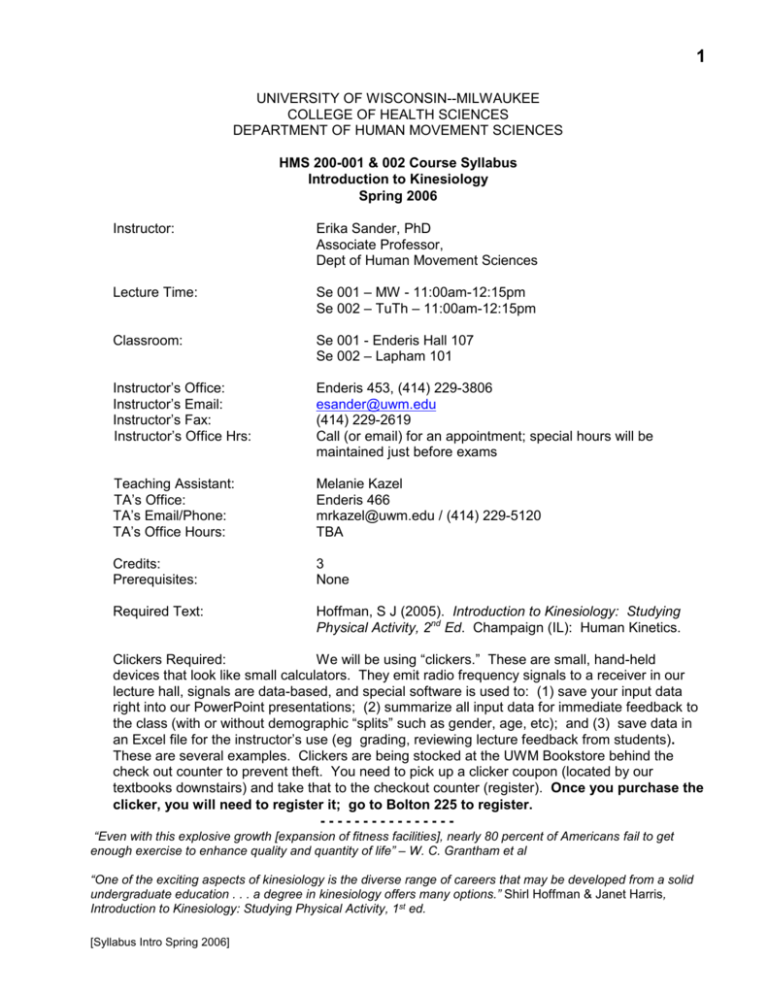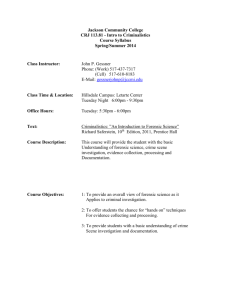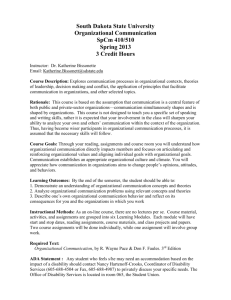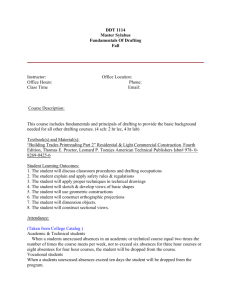Sander, Health Sciences - University of Wisconsin–Milwaukee
advertisement

1 UNIVERSITY OF WISCONSIN--MILWAUKEE COLLEGE OF HEALTH SCIENCES DEPARTMENT OF HUMAN MOVEMENT SCIENCES HMS 200-001 & 002 Course Syllabus Introduction to Kinesiology Spring 2006 Instructor: Erika Sander, PhD Associate Professor, Dept of Human Movement Sciences Lecture Time: Se 001 – MW - 11:00am-12:15pm Se 002 – TuTh – 11:00am-12:15pm Classroom: Se 001 - Enderis Hall 107 Se 002 – Lapham 101 Instructor’s Office: Instructor’s Email: Instructor’s Fax: Instructor’s Office Hrs: Enderis 453, (414) 229-3806 esander@uwm.edu (414) 229-2619 Call (or email) for an appointment; special hours will be maintained just before exams Teaching Assistant: TA’s Office: TA’s Email/Phone: TA’s Office Hours: Melanie Kazel Enderis 466 mrkazel@uwm.edu / (414) 229-5120 TBA Credits: Prerequisites: 3 None Required Text: Hoffman, S J (2005). Introduction to Kinesiology: Studying Physical Activity, 2nd Ed. Champaign (IL): Human Kinetics. Clickers Required: We will be using “clickers.” These are small, hand-held devices that look like small calculators. They emit radio frequency signals to a receiver in our lecture hall, signals are data-based, and special software is used to: (1) save your input data right into our PowerPoint presentations; (2) summarize all input data for immediate feedback to the class (with or without demographic “splits” such as gender, age, etc); and (3) save data in an Excel file for the instructor’s use (eg grading, reviewing lecture feedback from students). These are several examples. Clickers are being stocked at the UWM Bookstore behind the check out counter to prevent theft. You need to pick up a clicker coupon (located by our textbooks downstairs) and take that to the checkout counter (register). Once you purchase the clicker, you will need to register it; go to Bolton 225 to register. ---------------“Even with this explosive growth [expansion of fitness facilities], nearly 80 percent of Americans fail to get enough exercise to enhance quality and quantity of life” – W. C. Grantham et al “One of the exciting aspects of kinesiology is the diverse range of careers that may be developed from a solid undergraduate education . . . a degree in kinesiology offers many options.” Shirl Hoffman & Janet Harris, Introduction to Kinesiology: Studying Physical Activity, 1st ed. [Syllabus Intro Spring 2006] 2 Course Description This course introduces you to the study of kinesiology, the scholarly discipline that focuses on physical activity. You will learn about the subdisciplines comprising kinesiology through a series of presentations provided by faculty speakers and Human Kinetics graduate students. These subdisciplines include sociology of physical activity, motor behavior, psychology of sport and exercise, biomechanics of physical activity, and physiology of physical activity. You will also be taught to think about human movement in a new way, based on three sources: subjective experience, research findings, and the applications of practitioners in our field. Finally, you will learn about several of the professions that are based on principles of human movement science and about possible career paths for the student who majors in kinesiology. Rationale Whether you plan to work in fitness, sport, therapeutic or recreation settings, or whether you’re interested in finding out more about how physical activity can play an important role in your life, you will benefit from understanding some of the important principles and research underlying the field of kinesiology. Learning about the many benefits of physical activity can provide reinforcement for your personal decision to become (or remain) fit and healthy. Applying this knowledge can help others become (or remain) fit and healthy. In addition, few students are aware of the range of professions a person with a degree in kinesiology can enter, and this course will briefly introduce you to some of these careers. Course Objectives By the time you have completed this course, you will be able to: 1. Define and think about physical activity in new ways. 2. Appreciate the pervasiveness and diversity of physical activity in human life. 3. Provide a thoughtful justification, based on scholarly concepts and research, for incorporating physical activity into your life and the lives of others. 4. Explain the relationship between physical activity and quality of life. 5. Identify and discuss some basic concepts in each of the subdisciplines that comprise kinesiology. 6. Discuss what a major in kinesiology prepares you to do and identify several possible career paths. 7. Apply your critical thinking skills to class discussions, activities, exams, and course assignments. Class Format Research on learning has shown that some students learn better from group activities and class discussion where they can think out loud, while other students learn better from lectures and independent activities where they can think quietly by themselves. For this reason, we will use both kinds of learning activities. During class time, there will be lectures, class discussions, small group activities, independent activities, videos, and guest speakers. [Syllabus Intro Spring 2006] 3 Course Requirements Quizzes (40 points/20%) From time to time, we will give short objective quizzes to test your knowledge of the assigned readings and lectures. Quizzes will typically take place on the day assigned you new material to read and announced one class session ahead of time; they will include readings, videos and class discussion items. If you have a legitimate reason to miss class, you must get the instructors approval to do a make-up; makeups must be done within one week of the given quiz (no exceptions). If you have any questions or problems concerning the quiz policy, you should see the instructor immediately. You will have an opportunity to ask questions about the assigned reading before taking the quiz. Some quizzes will be done in D2L. Clicker Quizzes/Polling (30 points/15%) At the start of each class session, we will do “review quizzes” using clickers. In addition, and throughout class lecture, you will be using clickers to express opinions (called “polling”), respond to questions, etc. Your grade will be based on level of active participation and not if answers are right/wrong. To receive the maximum 30 pts for this category, you must participate at least 90% of the time in both categories: review quizzes and discussion questions. For those below 90% participation, point reductions will be made commensurate with your participation rate. Midterm Exam (50 points/25%) The midterm exam will be composed of short objective items, much like the quizzes. If you miss the midterm because of circumstances beyond your control, you will be able to make it up, at the discretion of the instructor. In order to pass this class you must take the midterm exam. Final Exam (50 points/25%) The final exam will cover the material from the second half of the semester. Like the midterm exam, the final will be composed of short objective items, much like the quizzes. If you miss the final exam because of circumstances outside your control, you will be able to make it up, at the discretion of the instructor. In order to pass this class you must take the final exam. Videotape Critiques (30 points/15%) Over the course of the semester, we will be viewing different exercise/movement videos in class. In small groups, you will evaluate the videos according to written guidelines, and share your views with the class. Your group critique will then be used to prepare for quizzes and will be graded high pass, pass, or fail. By the end of the semester, you (the individual) must have accumulated a passing grade on all video critiques in order to receive the entire 30 points. If you miss some critiques, your point allocation will be proportionately reduced. Grading System Quizzes Clicker Quizzes Midterm Exam Final Exam Video Analyses 20% 15% 25% 25% 15% Total 100% [Syllabus Intro Spring 2006] 40 points 30 points 50 points 50 points 30 points 200 points 4 Grading Scale (% of possible points) 100 – 94 % 93 -- 90 % 89 -- 88 % 87 -- 84 % 83 -- 80 % A AB+ B B- 79 – 78 % 77 – 74 % 73 – 70 % 69 – 68 % 67 – 64 % C+ C CD+ D 63 – 60 % D59 + below % F Course Policies 1. You are expected to attend all classes, unless circumstances beyond your control, such as family emergency, illness or a funeral make it impossible. You are responsible for making up the class material that you missed. If you have questions about what was covered during a class, please see the instructor. 2. You should be prepared for class every time we meet; this means you have read the assignment and are ready to discuss the main topics and to ask questions. Over the years, we have observed that students who skip the reading and try to get by with just the lecture notes do poorly in this course. 3. In order to receive at least a passing grade in this class, you must take both the midterm exam and the final exam. 4. Make-up exams will be given at the discretion of the instructor, if you are unable to take them due to circumstances beyond your control, e.g., family emergency, illness, or funeral. 5. No incompletes will be given unless you consult with the instructor before the last day of classes. Classroom Etiquette As you probably have discovered, college requires a different level of concentration, style of participation, and standard of conduct than your previous educational experiences. Because learning is fostered by courtesy in the classroom, it’s our responsibility on behalf of the class, the Department, and the University to maintain a good learning environment. Therefore, these basic expectations are presented to guide student classroom contact/interactions: 1. Please respect the opinions of others in the class even if you differ with them. This is essential to a professional interaction and, more generally, to good citizenship. You must speak and act respectfully at all times. Keep in mind, however, that it is perfectly possible to express differences in a respectful and passionate way, and you should feel free to do so throughout this course! Diversity of opinion makes for enriched learning. 2. Please understand that the rules stated in the syllabus and elsewhere for make-up exams, absences, and conduct must be adhered to in order to be fair to all students in this class. Being fair requires that all students are treated equitably. In the interests of fairness to all students, we cannot change the rules to suit your particular needs unless there is an exceptional reason to do so. 3. Please refrain from talking to each other while another class member or instructor (including guest lecturers) are speaking. Please turn off cell phones during class. [Syllabus Intro Spring 2006] 5 4. Please be on time for class. Coming in late affects the entire class. If it’s not possible to be on time (e.g., doctor’s appointment), please let the instructor know in advance. Statements of Accommodations and Academic Misconduct Participation by Students with Disabilities: If you need special accommodations in order to meet any of the requirements of this course, please inform the instructor no later than the third day of class. Accommodation for Religious Observances: Students will be allowed to complete examinations or other requirements that are missed because of religious observances. Academic Misconduct: The University of Wisconsin—Milwaukee will not tolerate academic misconduct. Academic misconduct is an act in which a student seeks to claim credit for the work or efforts of another without authorization or citation, forges or falsifies academic documents or records, intentionally impedes or damages the academic work of others, engages in conduct aimed at making false representation of a student’s academic performance, or assists other students in any of these acts. On the other hand, we strongly encourage class members to form smaller study groups to review course materials and prepare for assignments and exams. From our experience, informal study groups (and D2L discussion groups) help students learn course concepts with greater depth and breadth. Students are encouraged to review the Department of Human Kinetics Student Handbook of Policies and Procedures, which is available in Enderis 411. The Handbook offers students information regarding admission requirements, University policy regarding classroom accommodation, harassment, complaint procedures, and grade and grievance procedures. [Syllabus Intro Spring 2006] 6 HMS 200 – Intro to Kinesiology – Spring 2006 Class Schedule of Lectures, Readings, Exams, and Assignments (tentative only: subject to change) Date January 23/24 25/26 30/31 February 1/2 6/7 8/9 13/14 15/16 20/21 22/23 27/28 March 1/2 6/7 8/9 13/14 15/16 Topic Introduction to the course Introduction to Dept of Human Movement Sciences Video: “Quest for Fitness” Discovering the Field of Physical Activity Video: “Jack LaLanne” Spheres of Physical Activity Experience Spheres of Physical Activity Experience Importance of Physical Activity Experiences Video: (topic will be Obesity) Importance of Physical Activity Experiences Video: TBA (exercise program video) Assignment Read Chap 1 Review Chap 1 Read Chap 2 Read Chap 2 Read Chap 3 Importance of Subjective Physical Activity Experiences Read Chap 4 Importance of Subjective Physical Activity Experiences Video: “Playing to Extremes” Finish Chap 4 & Review for midterm exam. MIDTERM EXAM – will cover Lectures, Videos, Chap 1-4, Class Discussion [Spring Recess – 20/23 March] 27/28 Guests: Advising & Stats (Weitzer, Gruzis, Cashin) Scan Chap 5, 6,15&16 29/30 Guests: Motor Behavior (Hart & TA’s) Read Chap 8 April 3/4 Guests: Biomechanics (O’Connor & TA’s) Read Chap 10 5/6 Guests: Psychology & PA (Meyer, Smith & TA’s) Read Chap 9 10/11 Guests: Exercise Physiology (Strath, Swartz, Miller & TA’s) Read Chap 11 12/13 Guests: Exercise Physiology (Snyder & TA’s) 17/18 Guests: Sociology & Physical Activity (Hasbrook) Read Chap 7 19/20 Becoming a Physical Activity Professional Read Chap 12 24/25 Health & Fitness Professions Read Chap 13 26/27 Video: “Playing Unfair” May 1/2 Therapeutic Exercise Professions Read Chap 14 3/4 Guests: Athletic Training (Earl & Beine) Read Chap 16 8/9 Sport Management Professions Read Chap 17 10/11 Final Exam Review – final will cover Chap 5-17 (portions highlighted during lectures), videos, guest speakers. Final Exam - MW Sec 001 - Thurs 18 May 2006, 10am-12noon in Enderis 107 TuTh Sec 002 – Wed, 17 May 2006, 10am-12noon in Lapham 101 [Syllabus Intro Spring 2006]







